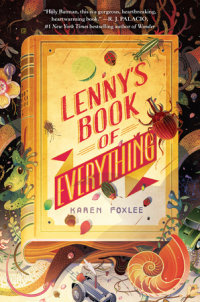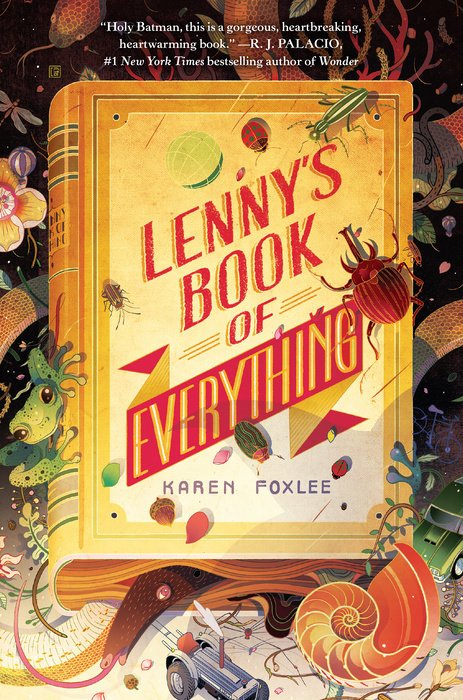Lenny's Book of Everything
"Holy Batman, this is a gorgeous, heartbreaking, heartwarming book." --R.J. Palacio, #1 New York Times bestselling author of Wonder
Perfect for readers who love Liar and Spy, Counting by 7s, and Bridge to Terabithia, a heartwarming and transformative novel about family, loss, and never giving up from beloved author Karen Foxlee.
Lenny Spink is the sister of a giant. Her little brother, Davey, suffers from a rare form of gigantism and is taunted by other kids and turned away from school because of his size. To escape their cruel reality, Lenny and Davey obsess over the entries in their monthly installment of Burrell's Build-It-at-Home Encyclopedia set. Lenny vows to become a beetle expert, while Davey decides he will run away to Canada and build a log cabin. But as Davey's disease progresses, the siblings' richly imagined world becomes harder to cling to in this deeply moving and original novel about grief, family, and wonder.
"An imaginative and surprisingly tender story of the unbreakable bond between siblings."--Booklist, starred review
"Lyrical and emotionally complex."--Kirkus
"The heart of this story--and the magic of it--is the devotion of these two siblings who together navigate the harsh realities of life and loss."--Publishers Weekly
"Foxlee's writing is infused with a hint of magic, just as the animals and places that Lenny and Davey read about fill their lives with curiosity and joy."--SLJ
An Excerpt fromLenny's Book of Everything
7 pounds 3 ounces • 20 inches • July 1969
Our mother had a dark heart feeling. It was as big as the sky kept inside a thimble. That’s how dark heart feelings are. They have great volume but can hide in small places. You can swallow them with a blink and carry them inside you so no one will know.
“Something’s not right,” she said when she brought baby Davey home from the hospital.
She rubbed her fingers over her chest and looked at him sleeping in the crook of her arm.
“I have a feeling,” she said.
She was good at knowing the wrongness of things, sadnesses and sicknesses, and in the park, she could always find the pigeon with one leg. She knew when Mrs. Gaspar was coming down with a wheeze before she wheezed. She knew my thin hair was caused by some undiagnosed malady. Some days were more wrong than others. Whole days. From the moment she opened her eyes, “Something’s not right,” she said.
“Does it hurt?” I asked her. I looked at my new baby brother and he was perfect as a walnut in its shell.
“No, it doesn’t hurt,” she said, and she took my three-year-old hand and put it to her heart. I could feel her ribs through her nightdress. “It’s not a hurting kind of feeling. Just a something-will-happen feeling.”
“A good thing or a bad thing?” I asked.
“It might be good or bad or somewhere in between,” she said. “We’ll have to wait and see.”
Davey was born six days after Neil Armstrong took his famous step and everyone was still crazy with moon-walk fever. Mother liked to tell the story if she was in a lying-on-the-sofa mood. An untying-her-hair mood. A tickle-my-feet-and-I’ll-tell-you mood. We knew all her stories by heart, word for word, so that we could have told them ourselves if we needed to. The story of the day her father died from a heart attack after blowing out his birthday candles. The story of her friend, Louis Martin, who was struck by lightning when he walked home from school in the rain. The story of the river and how she nearly drowned in it when she was seven, of the first dress she ever made, which her mother forbade her to wear because it was cherry red. The tale of the UFO she saw beside the highway when she ran away with Peter Lenard Spink.
“It was a perfect summer day when you were born” was always how the Davey story started.
She must have noticed all the perfectness from the bus window because she couldn’t afford the cab fare: Second Street glinting and shimmering in the heat, ponderous summer clouds sweeping their shadows over the sun-baking cars, marigolds growing in the park, children eating ice cream.
I was left behind with Mrs. Gaspar in number seventeen. She had two Pomeranians with marmalade-colored coats named Karl and Karla. The apartment smelled of them, and also ashtrays filled with white cigarette filters, each decorated with a ring of peach lipstick. Her apartment was a kaleidoscope of tan crocheted doilies and pumpkin-colored throw rugs, and even Mrs. Gaspar’s orange beehive, which sat a little askew on her head, matched the decor. Her hand-knitted clothes were unraveling and her pom-pom slippers had the disheveled look of something she had fished out of a trash can. She liked to bless me when my mother wasn’t looking. She drew crosses on my tiny forehead and whispered in Hungarian.
“Yes, it was a perfect summer day,” said Mother. “And I knew you were coming. I knew it and I hadn’t had a single contraction. Not one. But something told me I had to go to the hospital. Something said, Cynthia Spink, get to that hospital this instant.”
“What was the something?” I asked.
“Hush, now,” she said.
But I wanted to know. She was thin with worrying, our mother. She combed out her long fair hair with her fingers, closed her eyes. She was made almost entirely out of worries and magic.
“Was it a voice?” If it was a voice, it would sound like dry leaves.
“I said hush, Lenny, it’s my story. I took you across the hall to Mrs. Gaspar’s and then I caught the number twenty-four. The voice said, Get on that number twenty-four, Cynthia, because it doesn’t do the loop to Safeway. It goes all the way down Second with only five stops.”
I tried to imagine a voice like whispering leaves saying all that. I rolled my eyes at Davey but he ignored me because he loved his sudden-arrival story.
“You were a week late already. I sweated on that bus. I must have sweated a gallon. Then I stepped off that bus, down onto the sidewalk near that hospital, and wouldn’t you know it, I get a contraction that bends me in half and then another one just a minute later. And I get two more and I haven’t even made it to the hospital front door, Davey. And there were people running from everywhere but I had you right there on the doorstep with everyone walking past.”
“Holy Batman,” said Davey.
But it wasn’t like we hadn’t heard the story before. He knew there was more to come.
“But the thing was,” she said, “when you were born, they told me you had a true knot in your cord. A true knot, pulled tight, and that’s why you came out so quick, because my body and your body knew you’d run out of air and blood if you didn’t.”
Air and blood. I always repeated that part in my head. Air and blood.
“Gee,” said Davey.
“You almost might have never been,” said Mother.
“I’m glad you got the number twenty-four,” said Davey.
“You were a beautiful baby,” said Mother.
“Was I?” asked Davey.
“So beautiful,” said Mother.
But she didn’t mention the dark heart feeling to him, not ever, not once. That was always our secret. That was never in the story. She never told him how she asked Dr. Leopold if everything was fine.
“Why, he’s a perfect bouncing baby boy,” said Dr. Leopold.
“Are you sure?”
“Why, he’s perfectly normal,” said Dr. Leopold on the perfect summer day.
So she smiled and agreed.
“Father’s name?” the doctor asked. He was filling out the birth certificate.
“Peter Lenard Spink,” said Mother. “L-e-n-a-r-d.”
“Will Mr. Spink be in tomorrow to see his boy?” asked the doctor.
“Yes,” said Mother. “Yes, he will be.”

